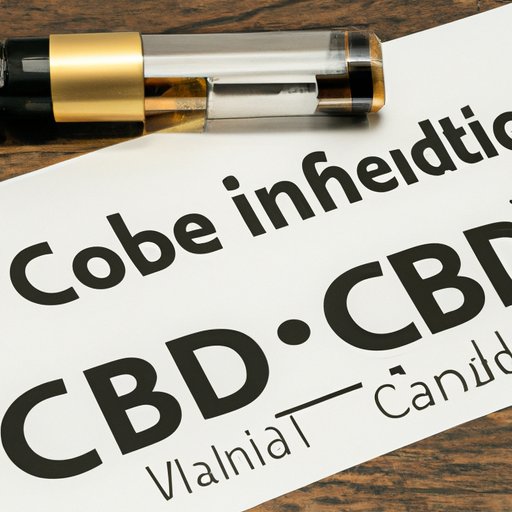Introduction
Smoking addiction is a significant problem worldwide, and quitting smoking is one of the most challenging things a person can do. The addiction to nicotine is both physical and psychological, which makes it difficult to break away from. People resort to different methods and aids to help them quit smoking, from nicotine gums to prescription medications to vaping. However, some people are turning to CBD as an alternative to help them quit smoking. This article explores the effectiveness of using CBD as a quitting aid.
The Science Behind CBD and Smoking Addiction
CBD, or Cannabidiol, is one of the many cannabinoids found in the cannabis plant. It targets the endocannabinoid system in the human body, which regulates various functions such as appetite, mood, pain, and inflammation. There is evidence to suggest that CBD can help smokers quit by interacting with brain receptors that are responsible for the addiction to nicotine.
CBD reduces cravings by interacting with the CB1 and CB2 receptors in the endocannabinoid system. By binding to these receptors, CBD prevents the release of dopamine, a neurotransmitter that plays a key role in addiction, including smoking addiction. By reducing the amount of dopamine in the brain, CBD can reduce the pleasure and reward associated with smoking.
CBD can also help relieve anxiety and stress that often lead to tobacco addiction. Research has shown that CBD has anxiolytic effects, which means that it can reduce anxiety and improve mood. People often turn to smoking to relieve stress and anxiety, and CBD can help them break this cycle.
Does CBD Work for Quitting Smoking?
Studies and personal experiences suggest that CBD can help smokers break the habit by reducing nicotine intake, improving sleep, and relieving withdrawal symptoms. A study by the University College London found that CBD reduced cigarette consumption by 40% in smokers who used inhalers containing CBD. The study also found that those who used CBD inhalers were less likely to crave nicotine.
CBD can also help improve sleep quality, which is often disrupted during nicotine withdrawal. A study conducted in 2019 found that CBD improved the sleep quality of patients with anxiety and reduced their anxiety levels. CBD can also relieve symptoms such as headaches, nausea, irritability, and restlessness, which are often associated with nicotine withdrawal.
The effectiveness of CBD as a quitting aid is comparable to other quit smoking aids such as NRT (nicotine replacement therapy), prescription medications, and vaping. However, CBD has the advantage of being a natural substance with fewer side effects.

Comparing CBD to Other Quit Smoking Aids
While CBD has shown promise as a quitting aid, it is essential to compare its benefits and drawbacks to other quitting aids. NRT has been scientifically proven to be effective in reducing nicotine cravings and withdrawal symptoms. However, NRT has its drawbacks, such as skin irritation and the risk of becoming dependent on nicotine replacement products.
Prescription medications such as varenicline and bupropion have also been proven to be effective in helping people quit smoking. They work by reducing cravings and withdrawal symptoms. However, they may have potential side effects such as nausea, vomiting, and insomnia.
Vaping has become a popular smoking cessation aid, but there is still debate about its effectiveness in the long term. Vaping involves inhaling a liquid, which often contains nicotine and other chemicals. While vaping can help reduce nicotine cravings, it may carry health risks, and the long-term effects of vaping are still unknown.
CBD, on the other hand, is a natural substance with fewer side effects. It can be used in different forms, such as edibles, tinctures, and inhalers. It works by reducing nicotine cravings, improving sleep, and relieving withdrawal symptoms. However, its legality and regulatory status may vary from country to country, and it is not approved by the FDA for smoking cessation.

Tips for Using CBD to Quit Smoking
If you are considering using CBD as a quitting aid, there are some practical tips to follow. It is essential to consult with your doctor before using CBD, especially if you have pre-existing medical conditions or if you are taking other medications. Your doctor can advise you on the right dosage and the best administration method for you.
CBD is available in different forms, such as edibles, tinctures, and inhalers. The dosage and administration method may depend on the form of CBD you choose. Edibles, such as gummies and candies, may take longer to take effect compared to tinctures or inhalers. It is also essential to start with a low dosage and gradually increase the dosage until you achieve the desired effect.
Potential side effects of using CBD may include nausea, diarrhea, dry mouth, and dizziness. However, these side effects are usually mild and temporary. It is crucial to stop using CBD and seek medical attention if you experience severe side effects.

Legal and Ethical Implications of Using CBD to Quit Smoking
CBD’s legality and regulatory status may vary from country to country, and it is not approved by the FDA for smoking cessation. In some countries, CBD is legal for medical use, while in others, it is only available with a prescription. It is essential to research your country’s laws and regulations regarding the use of CBD before using it as a quitting aid.
The moral controversies that arise from using an unapproved substance as a quitting aid are also worth considering. While some people view CBD as a natural and safe alternative to prescription medications, others question the lack of FDA approval and the potential risks of using an unregulated substance.
Success Stories of People Who Quit Smoking with CBD
Many people have successfully quit smoking with the help of CBD. Former smokers often credit CBD for reducing their nicotine cravings, improving their sleep, and relieving withdrawal symptoms. One former smoker, Sarah, says, “CBD helped me quit smoking by reducing my cravings and making me feel calmer. It also improved my sleep quality, which was a significant factor in my quitting journey.”
Another former smoker, John, shares, “I tried quitting smoking several times before, but I always relapsed. CBD helped me break the cycle of addiction by reducing my nicotine cravings and withdrawal symptoms. It was a game-changer for me.”
Conclusion
Quitting smoking is a challenging but essential step towards better health and wellbeing. While there are different methods and aids for quitting smoking, some people are turning to CBD as a natural and safe alternative. CBD can reduce nicotine cravings, improve sleep, and relieve withdrawal symptoms. It is comparable in effectiveness to other quitting aids, such as NRT, prescription medications, and vaping. However, it is essential to understand the legal and ethical implications of using an unapproved substance. Consult with your doctor and consider CBD as a possible option in your smoking cessation journey.
